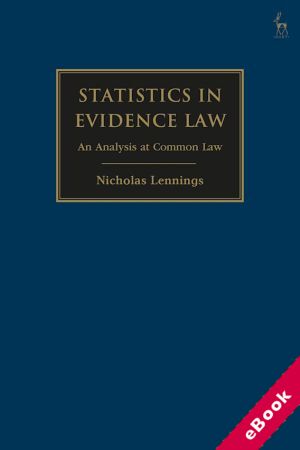
The device(s) you use to access the eBook content must be authorized with an Adobe ID before you download the product otherwise it will fail to register correctly.
For further information see https://www.wildy.com/ebook-formats
Once the order is confirmed an automated e-mail will be sent to you to allow you to download the eBook.
All eBooks are supplied firm sale and cannot be returned. If you believe there is a fault with your eBook then contact us on ebooks@wildy.com and we will help in resolving the issue. This does not affect your statutory rights.
This book evaluates the role played by statistical evidence in litigation. Despite the increasing prevalence of statistical evidence in modern litigation, how such evidence should be admitted and used by courts is often inconsistent and widely criticised. Accepting that statistical evidence can lead to more accurate decisions, the book proposes criteria that could allow courts to decide that statistical evidence is good for fact-finding.
The many and varied scholarly debates regarding statistical evidence have by and large avoided judicial attention. Unlike previous works, this book contextualises those debates in the language and practice of evidence law, focusing on Australia, the UK and the USA, and drawing on examples from other common law countries.
It does so by identifying that the controversy around statistical evidence follows the three-tired statistical syllogism underlying statistical inference: first, whether statistical evidence is capable of establishing an association between phenomena in a state of nature, second, that phenomena from the general association to an individual, and third, whether statistical evidence can be sufficient for proof of contested facts. Objections are said to arise at each level of the syllogism and, by mapping these objections onto evidence law, the book argues that a pathway for the judicial evaluation of statistical evidence can be constructed.